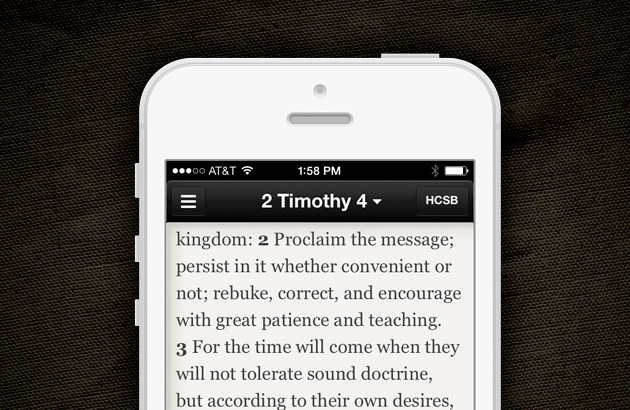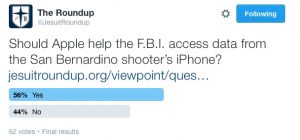My colleague, Hunter Gilbert ’16, recently published an opinion on the issue in which he states that “We as a society cannot allow for this man’s rights, regardless of what awful crime he committed, to be set aside because in the end all Americans will be affected.” While this article is not necessarily a response in the sense of the word to his work, the saliency of lucidity on the situation is needed. With some calling for Apple to release the ‘back door’ and others wanting Apple to protect the integrity of their users, it’s hard to see clear answers amidst the fray.
Determined to get a clearer picture, The Roundup’s Twitter page ran a poll to garner a wider scope on the issue: it showed that out of the 62 people that polled, 35 would believe that Apple should cooperate with the Department of Justice [DOJ] and its investigation. Albeit a slim majority, most people actively participating on Twitter see Apple’s cooperation as beneficial and morally justified course. Furthermore, The New York Times also addressed the issues of competing ethics in this situation, pitting “privacy versus security in an age of terrorism.”
Thus, I found myself back where I started: getting conflicting answers from social media and press. However, as many juniors are amidst learning the complexities of Catholic Ethics, it seems fitting to see what Catholic morality would say in this scenario.
For Ms. Christina Ellsworth, Theology teacher, she would say that the Church would espouse the view that “people always come first. People over businesses for the Catholic Church… The question here is whether or not privacy has to do with the protection of individuals. Many people, I can see, would say ‘not necessarily’, but it depends if you attach like the privacy with the safety and welfare of individuals.” She deduced, however, that “if the primary reason why apple Apple is preventing individuals from accessing that information is for the preservation of their company or well being of their company simply, then that is immoral.” This is a very, very intricate issue with many moving parts, most would say. With a situation like this, Ellsworth concluded by explaining that, “Yes, we have the Catechism, yes, we have official Church teachings, but when it comes to something as specific as this, we don’t have a ‘handbook’ for it.”
With words like “rights” and “national security” floating around, Mr. David Lugo, S.J., a junior Theology teacher, elucidated the terms within the context of the Catholic Church by asking: “How do we know that we have a right to privacy?” He added that if the right to security and the right to privacy both take root in the Constitution, “then we’ve just relegated both of those rights to the same authority.” On a basic level as humans, he concluded, “We do have a right to live safely and not to be afraid of our homeland… [The DOJ] is doing something so as to contribute to a body of knowledge so that they can make decisions down the line that would help to, maybe, ensure the safety of its populous.”
With national security coming into question, Lugo is unsure of the justification of an action under those means. He explains: “That’s the difficulty with national security: you can use it to justify anything… Is it a matter of national security to kill one to save a million? It might be; we do torture people, we do execute people… Are we justifying moral evils on the basis on a Utilitarian premise?” Utilitarianism, put simply, seeks to maximize the happiness for the most amount of people, disregarding the intentions or means of acquisition. The Church wouldn’t follow this ideal as the intention, along with all other parts of the moral act, need to act as one in order to justify an action.
However, there is also the idea of the slippery slope: that the DOJ would abuse this potential “back door” to peer and infringe upon the piracy of many Apple users. Lugo wouldn’t say that “unless Apple knew that the DOJ wanted to extend that key application to other iPhones, then Apple would be guilty of cooperation.”
Alandro Valdez ’17, member of the Jesuit Debate Team, has spent the year debating matters of government surveillance, national security, and invasions of privacy throughout the year. Valdez feels that they should “not give the FBI the back door that they’re looking for… One way that they would have to do [it] is to make a new software update for a whole iOS system that would compromise more than just one phone since [Apple] make phones exactly the same.” He adds that “it would apply to the rest [of the phones] and thus be able to open the rest of them.”
Viewing the situation in a Catholic moral sense, Valdez sees that “the ideas like ‘double-effect’ [wherein] you take in the consequences as well, you’d find that the intentions are good [in that] information on the terrorists can stop more terrorist attacks and save peoples’ lives.” Valdez concluded that “it is quite a slippery slope, unfortunately, because you can’t be certain one way or the other, so you [got to] make some assumptions.”
With more questions than answers posed, we are only left to watch the drama and formulate our own justifications in the continuing saga of Apple vs. The DOJ.







